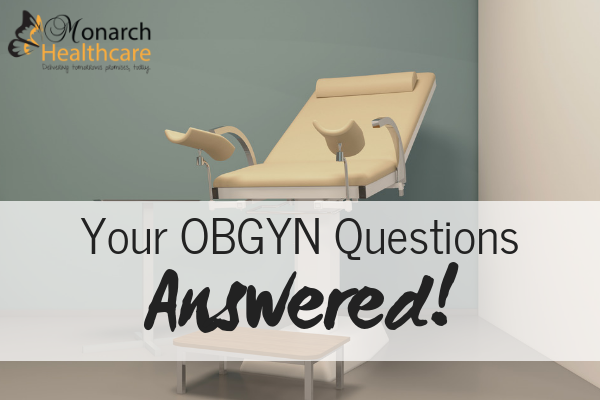Last month we got to chat with Dr. Huggins at Monarch Healthcare about pregnancy myths and truths and this conversation opened the door to so many more questions we have. As mothers and women, it always seems that we have a lot to keep in check. Even putting the work, mom, home-life to-do lists aside, we are still left with reminders to take care of our aging skin, birth control, eating right, keep tabs on our breast health, exercise, periods (and all that comes with that every month), the list goes on. Womanhood is such a beautiful thing… All sarcasm aside, I feel I am constantly learning something new when it comes to my health and the health of my friends.

So, with the chance to talk one on one with Dr. Huggins I came with questions that our readers have been wondering about with hope of bringing some clarity and information to a few topics.
Women’s Health Q & A
What are the best remedies for PMS (cramping, mood swings, etc.)?
Cue the 4,536th reason to exercise. It has been clinically proven that exercising at 80% of max HR for 30-60 minutes 3-5 days a week reduces PMS symptoms. Turns out the endorphin boost does more than just improve our mood. Consistent cardio can minimize cramping, back pain, and headaches when our cycles try to send us running for the heating pad. When all else fails, tried and true Midol can be a quick fix as well.
Taking Prozac episodically is another way to combat mood swings and irritability. Prozac has been found to improve mood during PMS when taken as needed.
“I started noticing that a few days a month were just awful – I was snapping, fighting with husband, crying, losing patience with my kids, etc. Dr. Huggins prescribed Prozac on an as needed basis during those special days of the month that I just wasn’t myself. I immediately noticed a difference in the way I felt and my mood right before and during my period. It’s great to know that taking medication only when I need to still has a positive outcome.”
My PMS symptoms seem pretty bad, at what point should I see my doctor?
If PMS symptoms cause vomiting or force you to miss school or work, you should see your doctor. Discomfort that can be soothed with Midol or exercise is annoying but common. Prostaglandins are produced by the endometrial layer cells just before our period. As those cells break down the prostaglandins are released causing headaches, cramping, diarrhea, and other wonderful things we experience during menstruation. For some these are severe and when the symptoms begin to interfere with everyday activities, make an appointment with your obgyn.
What is the best birth control for the short term?
If you would like to be pregnant in the near future, you want to know that the birth control you choose is quickly reversible. Implantable IUDs (intrauterine device) like Liletta or Nexplanon (for the arm) are highly effective and can be removed at any time. Your ability to conceive is back to normal as soon as the IUD is removed.
We’re done having kids (at least for a while), what about birth control for the long term?
Dr. Huggins recommends considering a nonhormonal copper IUD when pregnancy is not on your to-do list for a while. They last up to 10 years and are 99% effective. Once implanted (in office procedure) there really is nothing else to think about for as long as you’d like to keep the IUD. An added bonus is that most women find their periods are significantly lighter or stop altogether.
When you’ve decided your family is complete tubal ligations and ablations are options to consider. These are lightly invasive out-patient procedures. Some benefits include a decreased ovarian cancer risk and no more periods.
If I’m on the pill, is it safe to skip or choose when I have my period?
Yes. One benefit of taking a pill every day is the ability to choose when you take the placebo and begin your period again. Adjusting that to fit your schedule is just fine.
I’ve had an abnormal pap in the past, what should I be doing and considering now?
Women should begin having pap smears by age 21. If they all come back normal, they should be done every 3 years. (**a reminder that yearly exams are still recommended) If you have an abnormal result, a biopsy may be the next step to determine the cause and if any further treatment is necessary. From there, yearly pap smears will likely be the best path forward.
As always, Dr. Huggins’ best advice for women is to be honest and open with our doctor. Your annual exam is not a time to be shy – ask questions and get answers that are right for you. There are answers and your obgyn is there to help.
Monarch has provided our readers with great information on a variety of women’s health topics – 3 Things You Should Be Asking Your OBGYN, Breast Health and Annual Exams, and Pregnancy Myth or Truth.






 Monarch Healthcare
Monarch Healthcare






